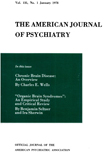A PSYCHIATRIC EVALUATION OF LAWS OF HOMOSEXUALITY
Abstract
Our review of legal phraseology and terms serves to highlight the confusion, prudery, and rigid tradition that surround sodomy and related acts in substantive and procedural law.
First, the ubiquitous use of the term, "against nature, unnatural" is traced to an ecclesiastic hairsplitting definition as to what is sin and to what degree. Sodomy, the crime against nature, at one time subject only to ecclesiastic censures, came to be classed with treason, heresy, and such crimes. The harsh penalty is then cited by modern justices as proof of how heinous is the crime, its details too revolting to be mentioned. An Oregon opinion classed fellatio (involving adults) as just as unnatural as sodomy per anum because in nature the sex organs are concerned with reproduction, the alimentary canal with nutrition; thus it "is self-evident that use of either opening of the alimentary canal for the purpose of sexual copulation is against the natural design of the human body."
This prudery and hush-hush attitude on the part of the courts lead to serious defects. The defendant is entitled to know the exact nature of the acts of which he is accused, with their manner of performance and time of occurrence, as in other crimes. The defendant's desire to prove an alibi requires the prosecution to specify a definite time for the act; but this has not been done in some cases.
Attempts to compare the heinousness of sex crimes or to determine the exact degree of guilt are often influenced by emotion and may be open to question. Hebrew tribal law once ruled that the beast involved in an act of sodomy should also be stoned, though it had committed no crime.
More and more law enforcement agencies—police, district attorneys, narcotic bureaus—are demanding loosely written laws under which they can "throw the book at anyone they want to get." Admittedly, such laws could be used unfairly, but the authorities maintain that they will never do so; that such laws are needed to catch the real criminals.
Laws, as many are being written at present, are taking away the idea that a man is innocent until he is proven guilty. This zeal and effort to get cover-all laws under which to catch the extraordinary offender have resulted in enactments that make guilt by association. Behind this change in law is the idea that conviction of the guilty is all-important; that it is better to convict one innocent person than to let 100 guilty ones escape; whereas, it used to be a guiding principle that it is preferable to let 100 guilty escape rather than to wrongly convict a single innocent person.
Under national security and commissioned corps regulations, unproved gossip about a person's homosexuality may cause his dismissal from government employ or the armed services. This charge then appears on his record and may prevent his getting another job. Such regulations may cause any number of innocent men to be stigmatized as homosexuals, their careers lost, their lives ruined. They may well have been cast out by a group about whom the same gossip could be raised.
Those with much experience in criminal law have made various suggestions. Ploscowe finds that laws against sodomy, homosexual acts or crimes against nature are "practically unenforceable." According to one study, 6 million homosexual acts take place yearly for every 20 convictions. This means that mainly the indiscreet and unfortunate are caught and convicted.
Access content
To read the fulltext, please use one of the options below to sign in or purchase access.- Personal login
- Institutional Login
- Sign in via OpenAthens
- Register for access
-
Please login/register if you wish to pair your device and check access availability.
Not a subscriber?
PsychiatryOnline subscription options offer access to the DSM-5 library, books, journals, CME, and patient resources. This all-in-one virtual library provides psychiatrists and mental health professionals with key resources for diagnosis, treatment, research, and professional development.
Need more help? PsychiatryOnline Customer Service may be reached by emailing [email protected] or by calling 800-368-5777 (in the U.S.) or 703-907-7322 (outside the U.S.).



